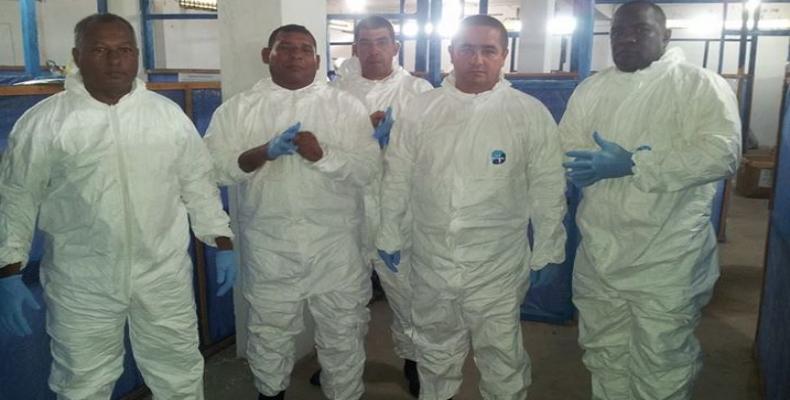Doctor Ronald Hernandez is one of the Cuban health professionals with the Henry Reeves Medical Brigade, who joined the international fight against Ebola in Africa, following the call of the United Nations and the World Health Organization.
An active facebook user, Doctor Hernandez (second from right to left in the picture) sends daily reports to his friends about the brigade working in Liberia, which Radio Havana Cub a is reproducing for our audience around the world.
In his latest reports, the physician says: "I´ve been a doctor for over 20 years. I have attended many lectures on Ebola; I've read a lot about it, but nothing compares to directly treating an Ebola patient."
"We have to do everything possible and even what seems to be impossible to stop this epidemic and prevent more deaths due to lack of medical attention. I feel so proud of my profession every passing day, of the altruism and internationalism, thanks to Fidel, thanks to Raul, thanks to Che Guevara."
The Cuban medical brigade in Liberia continues to advance its work in what is known as the "red zone" as they check on hospitalized patients. However, no cameras or personal objects are allowed in isolation rooms, which is why there are no photos, the doctor explains.
For those who follow these reports, it is interesting to learn details about the work of the Cuban doctors in Africa, as Doctor Hernandez explains what bio-security implies:
First: Personal Protection suits are impermeable and protect your entire body; we also use rubber boots, masks and glasses. We wash our hands with 0.5 percent hypochlorite every time we treat a patient and we must change gloves. We always work in pairs or three-doctor teams. Hospitalization includes three stages: suspected cases, presumed cases and confirmed cases. And in the wards, we never use any personal items, not even pens. All aspects about the patients are written on a special screen, similar to a board.
The most risky moment is when we take off our suits, because you can touch a bit of vomit, fluid from the patients, so we are assisted by our epidemiologists towards the exits of the ward, they are the soul of our mission as they lead us all the way through with psychological support after we spend over two hours in those suits that you only want to take off.
The doctor also says that they are able to rest after working 6-hour shifts, but they do not stay more than two hours inside the red zone.
More to come in upcoming Special Reports from Africa.


